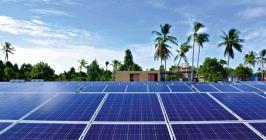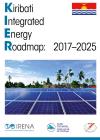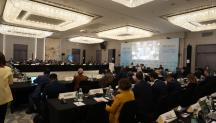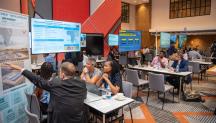

Kiribati Integrated Energy Roadmap: 2017-2025
This Roadmap report highlights key challenges and presents solutions to make Kiribati’s entire energy sector cleaner and more cost effective.
Newsletter
In 2015, the Government of Kiribati asked the International Renewable Energy Agency (IRENA) and Pacific regional organisations to help it develop a comprehensive energy roadmap, including potential to scale up renewables and energy efficiency, in the years until 2025. The resulting Kiribati Integrated Energy Roadmap (KIER) highlights key challenges and presents solutions to make Kiribati’s entire energy sector cleaner and more cost effective.
As a small, remote island state, Kiribati is highly dependent on imported energy supply. Electricity is one of the government’s largest expenditures. Yet the current fossil fuel-based power system is inadequate to meet future demand. According to the KIER analysis, energy efficiency improvements on both the supply and demand side could reduce the use of fossil fuels for power generation by 22% in less than a decade.
While power generation and transmission are crucial, other energy uses also offer opportunities for improvement. Continued solar photovoltaic (PV) power deployment, for example, can be complemented with greater energy efficiency, as well as renewable cooling and transport solutions. A successful solar home system (SHS) programme should be supported and expanded, the report says. Looking to address challenges at the local level, the roadmap recommends solar desalination in South Tarawa; a combination of wind power, PV and battery storage for Kiritimati Island; and renewable-based refrigeration for fish in the Outer Islands.
In addition, biofuels and electric vehicles could make transport on and between the islands sustainable. Existing plans also call for a 1 megawatt (MW) Ocean Thermal Energy Conversion (OTEC) plant as a step towards future energy self-sufficiency.
Road-mapping shows how renewables can be scaled up faster, given prevailing technical, economic and policy elements. IRENA has also worked with Barbados, Cyprus, the Dominican Republic, Nauru, the Maldives and Mauritius to outline paths to a viable future energy mix dominated by renewables. See highlights of island case studies and the methodology for national roadmaps in IRENA’s National Energy Roadmaps for Islands brochure.
As a small, remote island state, Kiribati is highly dependent on imported energy supply. Electricity is one of the government’s largest expenditures. Yet the current fossil fuel-based power system is inadequate to meet future demand. According to the KIER analysis, energy efficiency improvements on both the supply and demand side could reduce the use of fossil fuels for power generation by 22% in less than a decade.
While power generation and transmission are crucial, other energy uses also offer opportunities for improvement. Continued solar photovoltaic (PV) power deployment, for example, can be complemented with greater energy efficiency, as well as renewable cooling and transport solutions. A successful solar home system (SHS) programme should be supported and expanded, the report says. Looking to address challenges at the local level, the roadmap recommends solar desalination in South Tarawa; a combination of wind power, PV and battery storage for Kiritimati Island; and renewable-based refrigeration for fish in the Outer Islands.
In addition, biofuels and electric vehicles could make transport on and between the islands sustainable. Existing plans also call for a 1 megawatt (MW) Ocean Thermal Energy Conversion (OTEC) plant as a step towards future energy self-sufficiency.
Road-mapping shows how renewables can be scaled up faster, given prevailing technical, economic and policy elements. IRENA has also worked with Barbados, Cyprus, the Dominican Republic, Nauru, the Maldives and Mauritius to outline paths to a viable future energy mix dominated by renewables. See highlights of island case studies and the methodology for national roadmaps in IRENA’s National Energy Roadmaps for Islands brochure.




